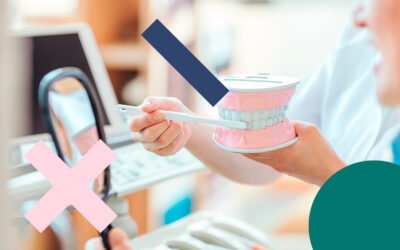Salivary pH plays a very important role in maintaining oral health. This substance produced in the salivary glands of the mouth helps maintain an adverse environment for bacteria to thrive. The pH of saliva decreases the risk of tooth decay and other gum infections.
Although saliva is responsible for maintaining a balanced pH in the mouth, there are some external factors that can have the opposite effect to the desired one. To allow saliva to properly fulfill its role in what is called the 'buffer mechanism', it is important to maintain good daily habits.
Do you know how the pH of your saliva influences the health of your teeth and gums? Discover the best tips for a good maintenance of your mouth, while taking care of the health of your whole body.
What is pH?
The pH is a scale of values that indicates the level of acidity and alkalinity of a substance. It is measured from 0 to 14, with zero being the most acidic level, 14 being the most alkaline level, and 7 being the neutral level.
How are these values determined? As in many other measurements, the water is taken as a reference. Specifically, pH 7 is the level of pH 7 in pure water. It is considered to be the perfect balance between the two extremes, although, as we will see below, this exact value is never reached in the human body.
The only substance that has a neutral pH is water in its maximum purity. It is normal to find acidic substances such as wine, vinegar or fruit, and alkaline substances such as seawater or antacid products taken for the stomach.
It is impossible for our organism to be in total equilibrium, with a pH of 7. For example, human blood has a pH slightly above 7, so it is alkaline. In contrast, the normal pH range of saliva is between 5.6 and 7.9 and is generally acidic.
What is the relationship between saliva pH and oral health?
The mouth is an aqueous ecosystem due to the constant presence of saliva. This substance has different very important functions in the oral cavity, as a lubricant, to aid swallowing, to facilitate food digestion and to keep the oral microbiota under control.
It is very important to prevent the entry and spread of external microorganisms, and to limit the proliferation of those naturally found in the oral cavity. The mouth is a means of communication between the body and the outside world, and saliva is one of its main protective barriers.
Saliva has a buffering capacity or buffer mechanism that allows it to maintain the oral pH relatively constant. However, when consuming beverages and food, the salivary pH will be transiently modified.
The most consumed foods in the current diet usually have an acid pH, which produces an acidification of the salivary pH that, if maintained over time, could cause demineralization of tooth enamel. This damage to tooth enamel allows bacteria in the mouth to have better access to the dentin, or inner tissue of the tooth.
Other foods that can alter the salivary pH are sugary foods. If their remains are available to bacteria, these metabolize the sugars releasing acids, which causes a drop in pH and, therefore, an increased risk of caries.
How to maintain optimal saliva pH for proper oral health
As we have seen above, dietary habits are currently the main factor in salivary pH imbalance. These include frequent intake of sugary foods, drinks with an acid pH such as soft drinks, fruit juices, energy drinks, coffee or alcohol and prolonged exposure of the teeth to these acids, favoring direct damage to dental enamel.
Enamel wears down more quickly because of these harmful habits. Teeth turn yellow, and the risk of cavities is higher. If they are not corrected in time, the enamel loses its ability to repair and the only solution would be to go to the dentist to apply the corresponding corrective treatment.
What can be done to maintain the correct pH balance of saliva for healthy teeth? Let us look at some measures that can help regulate salivary pH.
How to maintain an optimal saliva pH for proper oral hygiene
If these habits are not corrected in time, the enamel loses its ability to repair itself. Teeth and gums can suffer from typical infections such as cavities or periodontal disease, and the only solution is to see a dentist for treatment and correction.
What can we do to keep the pH of saliva in balance for healthy teeth and gums? While it is not always possible to completely avoid consuming acidic foods and beverages, there are some measures that can help regulate salivary pH.
Oral hygiene
In order to prevent oral bacteria from gaining access to sweet food debris left in the oral cavity, it is very important to maintain daily hygiene by choosing the right oral care products. oral care products products that are best suited to your needs. Do not forget to brush your teeth after every meal, and especially before going to bed, using a toothpaste with fluoride.
Combine brushing with the use of other accessories and oral hygiene products, such as dental floss, interdental brushes and Mouthwash, to reach those areas of the mouth where the toothbrush cannot reach. Follow these habits for perfect oral hygiene.
A very important recommendation is not to brush your teeth immediately after drinking acidic foods or beverages, as the enamel will be more weakened. Use a soft-bristled toothbrush so as not to wear down the enamel.
Feeding
Avoid or reduce as much as possible the consumption of acidic or sugary foods and beverages. If you drink a sugary or highly acidic beverage, do not do so for a prolonged period of time, in order to reduce the enamel's exposure to acids.
The consumption of dairy products such as milk, cheese or natural yogurt helps to balance the pH of the saliva. Alkaline foods are excellent for neutralizing oral pH.. Maintain a healthy mouth with daily care routines.
Discover our products for daily oral care

Hydration
Maintain proper hydration, drinking water instead of acidic or sugary drinks. This way you favor the natural production of saliva, avoiding dry mouth problems or xerostomia.
A trick to regulate the pH of the saliva when drinking acidic beverages such as soft drinks, coffee or wine is to drink water right after. Water eliminates acid residues from the mouth and favors pH regulation.
With these tips for keeping the pH of your saliva within the optimal range, your mouth will be healthier and better protected against the bacteria responsible for tooth decay and periodontal disease.


 How to relieve pain with newly placed braces?
How to relieve pain with newly placed braces? How to keep your breath fresh?
How to keep your breath fresh? 10 Tips to take care of the oral health of the little ones
10 Tips to take care of the oral health of the little ones


